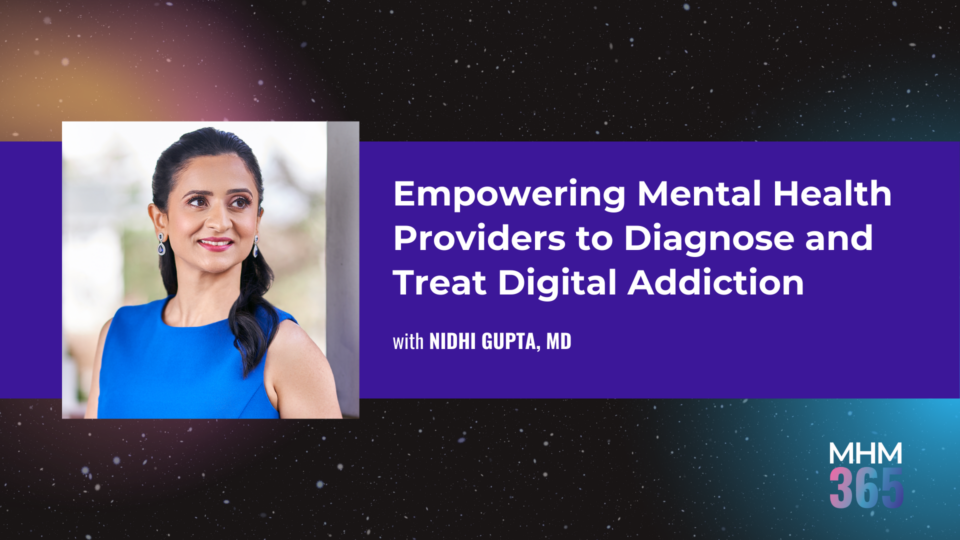Empowering Mental Health Providers to Diagnose and Treat Digital Addiction

Empowering Mental Health Providers to Diagnose and Treat Digital Addiction

Digital addiction has impacted the human brain in unimaginable ways. A plethora of research indicates clear links between digital addiction and mental health disorders, including anxiety and depression. The United States is dealing with a looming epidemic of loneliness, and unfortunately, the relationship with digital devices has a vital role to play.
This continuing education course is a practical toolbox to help mental health providers nurture their clients’ digital well-being as well as their own. It will be valuable for those wishing to develop or improve the skills vital to thriving in the digital age. Etiology, signs and symptoms, consequences, assessment tools, and treatment modalities for digital addiction will be reviewed. Key concepts in the process are broken down and simplified.
- • Social Worker
- • Marriage & Family Therapist
- • Counselor
- • Substance Use Disorder Professionals
The educational goal of this course is to provide participants with a practical toolbox that can be used to empower mental health providers in evaluating, diagnosing, and treating digital addiction in all ages.
At the end of this course, participants will be able to:
-
Explain Digital Addiction, including its causes and the role of dopamine and serotonin.
-
Identify and describe 3 or more signs and symptoms of digital addiction.
-
Explain how to utilize assessment tools and questionnaires to assess digital addiction.
-
Identify 2 ways digital addiction impacts physical and 2 ways digital addiction impacts mental health.
-
Describe at least 3 evidence-based treatment approaches for treating digital addiction.
-
De-Sola Gutiérrez, J., Rodríguez de Fonseca, F., & Rubio, G. (2016). Cell-Phone Addiction: A Review. Frontiers in psychiatry, 7, 175. https://doi.org/10.3389/fpsyt.2016.00175
-
Gupta, N. (2023). Impact of Smartphone Overuse on Health and Well-Being: Review and Recommendations for Life-Technology Balance. Journal of Applied Sciences and Clinical Practice 4(1):p 4-12 https://journals.lww.com/jasc/fulltext/2023/04010/impact_of_smartphone_overuse_on_health_and.2.aspx
-
Gupta, N. (2023). Impact of Smartphone Overuse on Health and Well-Being: Review and Recommendations for Life-Technology Balance. Journal of Applied Sciences and Clinical Practice 4(1):p 4-12 https://journals.lww.com/jasc/fulltext/2023/04010/impact_of_smartphone_overuse_on_health_and.2.aspx
Trusted Provider Network, LLC is recognized by the New York State Education Department’s State Board for Social Work as an approved provider of continuing education for licensed social workers #SW-0654.
TPN.health, #1766, is approved to offer social work continuing education by the Association of Social Work Boards (ASWB) Approved Continuing Education (ACE) program. Organizations, not individual courses, are approved as ACE providers. State and provincial regulatory boards have the final authority to determine whether an individual course may be accepted for continuing education credit. TPN.health maintains responsibility for this course. ACE provider approval period: 03/31/2022 – 03/31/2025. Social workers completing this course receive 1 Clinical continuing education credits.
Trusted Provider Network, LLC is recognized by the New York State Education Department’s State Board for Mental Health Practitioners as an approved provider of continuing education for licensed marriage and family therapists #MFT-0097.
TPN.health is a CAMFT-approved continuing education provider, provider #1000101.
Trusted Provider Network, LLC is recognized by the New York State Education Department’s State Board for Mental Health Practitioners as an approved provider of continuing education for licensed mental health counselors. #MHC-0220.
TPN.health has been approved by NBCC as an Approved Continuing Education Provider, ACEP No. 7267. Programs that do not qualify for NBCC credit are clearly identified. TPN.health is solely responsible for all aspects of the programs.
This course has been approved by TPN.health, as a NAADAC Approved Education Provider, for educational credits. NAADAC Provider #198061, TPN.health is responsible for all aspects of the programming.This course has been approved by TPN.health, as a NAADAC Approved Education Provider, for educational credits. NAADAC Provider #198061, TPN.health is responsible for all aspects of the programing. Counselor Skill Group: Legal, Ethical and Professional Development


